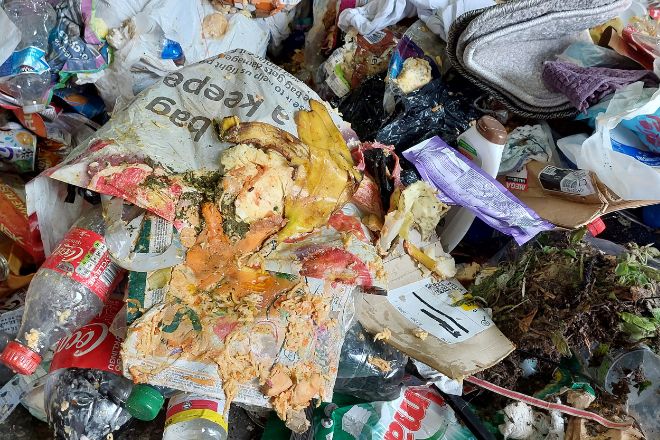Derby City Council has revealed that the cost of processing and disposing of contamination (incorrect or dirty items) in recycling bins is currently costing £450,000 a year. Some of the most common problem items are bagged waste, used nappies, food waste, electricals, hard plastic, and plastic bags and films.
Things like food waste and leftover takeaways are particularly problematic as they spread in the collection vehicles, contaminating large amounts of otherwise clean and dry recycling.
Batteries and items containing batteries (such as old phones and vapes) are another contaminant which pose a very real fire risk in the back of collection vehicles and at processing sites. Batteries or anything containing batteries should never be placed in a wheelie bin.
Each month, around 300 tonnes of waste material is separated from the recycling and sent for disposal at significant cost. Much of which is avoidable.
The campaign is asking all residents with blue recycling bins to pick up just two simple habits:
- Check before you chuck – Instead of looking at recycling information on the packaging, residents should check the Council website. There is a handy A-Z that explains what can be done with common household items. As much as 70% of household waste can be recycled, so even if it can’t be put in the blue bin, residents still know what to do to make sure it’s recycled.
- Wash and squash – The most valuable recycling is clean and dry. Any items with product residue still on them (empty food cans, toiletry bottles, food trays etc.) should be rinsed before they’re placed in the blue bin. Flatten down large carboard boxes to make more room in the bin.
Collection teams routinely check the contents of blue recycling bins for contamination and bins that have visible contamination won’t be collected. It is then the resident’s responsibility to remove any contamination before their next scheduled collection.
Councillor Hardyal Dhindsa, Cabinet Member for Communities and Streetpride commented:
“Most of our residents are great at recycling and do the city proud. However, as a city we can recycle more and we can recycle better. We know it’s easy to think that one wrong item doesn’t matter but it really does. Just one household not recycling correctly can spoil it for all their neighbours.
“Whilst rising costs continue to effect residents, they also add pressure to the Councils budget. If everyone recycled correctly, the money saved could fund services like free bulky waste collections, street cleaning and help protect vulnerable residents.
“Additionally, recycling is the right thing to do for our environment. As a Council, we’ve committed to being net-zero by 2035 and residents improving their recycling is a part of that ambition.”
As part of the campaign, Derby City Council are working alongside partner organisations to amplify messages to communities across the city.
What happens to recycling after it’s collected:
All recycling in the city is taken to a waste transfer station. The recycling is inspected by workers and some contamination is removed by hand (non-recyclable items such as bagged waste, garden hoses, clothing, textiles, DIY waste). Where large volumes of recycling are contaminated, a shovel loader is used to remove huge amounts of waste at a time to prevent further contamination.
The recycling is then sent to a Material Recovery Facility, where it is sorted predominantly by machinery, but also by hand. Further contamination is removed through this sorting process.
Any rejected waste is sent for disposal rather than being recycled into new products.
The £450,000 cost to the Council is specifically for the removal and disposal of waste that can’t be recycled.
Currently, 38% of household waste is recycled in Derby. The Government target is for 55% of household waste to be recycled by 2025.
